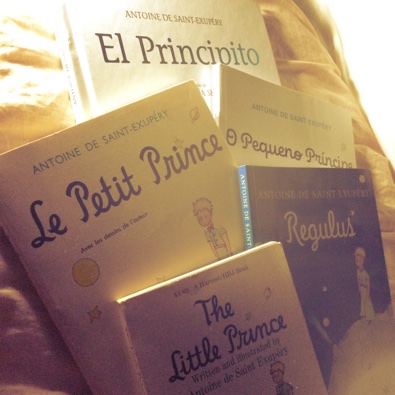
Photo: A collection of “Le Petit Prince” books in various translations.
“Le Petit Prince” (French), “The Little Prince” (English), “Regulus” (Latin), “O Pequeno Principe” (Portuguese), and “El Principito” (Spanish) are a few of the titles of Antoine De Saint-Exupéry’s book that has been translated over three hundred and one times. The pile of books began as a collection of “The Little Prince” after a desire to brush up on foreign languages in a delightful way.
A helpful way to learn a new language is to read a body of text translated into another language, compared side-by-side with a book in another language. It starts on page one with a boa constrictor devouring its prey; followed by a boa constrictor devouring an elephant; pages go by when the little prince ask the pilot to draw a variety of styles of sheep; and finally there is a chapter about wild baobabs growing uncontrollably on the planet. Rinse, wash, repeat. This method of learning a new language ensures that any new phrases picked up would be worded similarly to the writings of Antoine De Saint-Exupéry.
A universal trait that each book translation shares are the same illustrations throughout the book. This is helpful in many ways, especially in reenforcing the idea that drawings speak volumes in telling a story without the need to be translated.
Learning a new language can be as easy as picking up a favorite book in a different language. How do you study foreign languages for fun?
.::.
What's Quacking?
Do you have any original art to contribute to our stock image database, announcements, community projects, ideas, news, or milestones to report? Please leave general comments below or send a PQ to kawaiidaigakusei. Email me at kawaiidaigakusei(at)gmail(dot)com.

Books of Babel
kawaiidaigakusei at 12:00AM, Jan. 31, 2022
4 likes!


©2011 WOWIO, Inc. All Rights Reserved Mastodon





Corruption at 8:37PM, Jan. 31, 2022
Learn the swear words and insults, or things that are most useful. All the German I can remember are swear words, Yes, No, and 2 questions "Where is the women? Where is the beer?" and 2 sentences "I speak no German. I speak English" What else is needed to know in German? Why, I have learned how to swear in English (modern and old), Gaelic, French, German, Norse, Italian, Latin, Greek, Spanish, Japanese, Chinese, Arabic, Hebrew, Turkish, Russian and a some where I don't know what language it is. Sadly I have forgotten most of them due to disuse.
PaulEberhardt at 12:04PM, Jan. 31, 2022
Some of my students like this idea, I'm sure. It's useful in another way, too, because they invariably find out that there is no such thing as a 1:1 translation and that comparing the versions actually leads to more thinking instead of less (from which, in turn, they learn that in real life nothing ever works as planned - valuable lesson no. 3). In my experience, it's more difficult with older children's books whose translators liberally "translated" the characters' names (the Little Prince is a lucky exception, as there aren't really any names in the first place). Kids tend to balk at their favourite characters suddenly having another name. Today, translators don't do that as often any more (in Germany), but the fact that "Hermine" from Harry Potter is in fact Hermione is already enough to cause them more discomfort than a single "o" warrants; especially as it's just about the only name that has been changed; all the others have been left as they are in English, even the punny ones.
Banes at 7:29AM, Jan. 31, 2022
Interesting! Seems like a strong way to start immersing in other languages. It would be fun, and that'd make it more motivating.